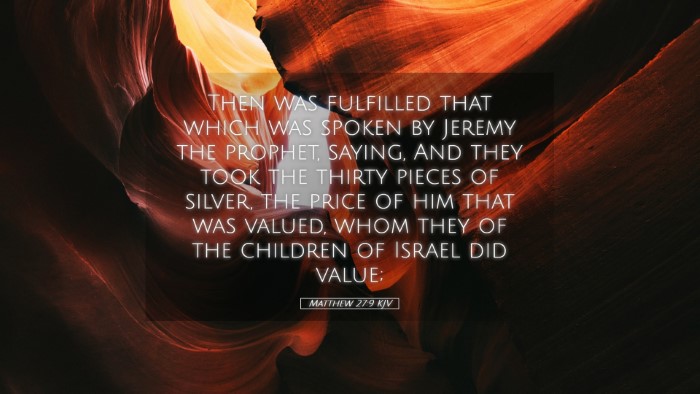Bible Commentary on Matthew 27:9
Verse: Matthew 27:9 - "Then was fulfilled that which was spoken by Jeremy the prophet, saying, 'And they took the thirty pieces of silver, the price of him that was valued, whom they of the children of Israel did value.'"
Introduction
This verse from the Gospel of Matthew highlights the fulfillment of prophecy regarding the betrayal of Jesus. It identifies a specific act connected to Judas Iscariot's betrayal and makes a profound connection to the prophetic words expressed by Jeremiah, suggesting a deeper significance to the actions that transpired. Understanding this verse requires delving into rich commentaries which elucidate its theological implications and prophetic fulfillment.
Overview from Public Domain Commentaries
Several noted commentaries, including those from Matthew Henry, Albert Barnes, and Adam Clarke, provide theological insights into the significance of Matthew 27:9.
Matthew Henry's Commentary
Matthew Henry notes the prophetic nature of this verse, emphasizing that the betrayal of Jesus and the specification of thirty pieces of silver fulfill the spoken word of God through the prophet. Henry points out that the price, thirty pieces of silver, was of little worth, reflecting the low estimation of Jesus by His own people.
- The Role of Prophecy: Henry underscores that this fulfillment demonstrates God's sovereignty and foreknowledge. The betrayal by Judas, culminating in the money exchanged, aligns with the prophetic voice of the Hebrew Scriptures.
- Spiritual Implication: This act of betrayal serves as a stark reminder of how easily human beings can undervalue what is sacred. The thirty pieces symbolize not just money, but the trivialization of Jesus’ worth.
Albert Barnes’ Notes on the Bible
Albert Barnes provides additional context by identifying the scriptural source of the prophecy, attributing the mention of Jeremiah to a broader prophetic tradition. He mentions that while Zechariah also speaks of thirty pieces of silver, the linkage to Jeremiah reflects a common practice in Jewish tradition where the mention of one prophet could encapsulate the teachings of several.
- Historical Context: Barnes expounds on the historical significance of the thirty pieces of silver, citing its association with the price of a slave in Exodus 21:32, again reinforcing the low valuation of Jesus by those who should have recognized Him as the Messiah.
- Christ’s Worthiness: The price paid for Jesus is contrasted with His divine worth and mission, encouraging believers to reflect on the gravity of betrayal against one who is supremely worthy.
Adam Clarke's Commentary
Adam Clarke elaborates on the linguistic aspects and the implications of the verb tense used in the original texts, emphasizing that the fulfillment was not merely passive but essential to the unfolding narrative of salvation history.
- Divine Orchestration: Clarke notes that God orchestrated this act not merely to fulfill scripture but to advance His redemptive plan. The mention of Jeremiah, albeit confusing due to actual references in Zechariah, invites readers to explore the intertextuality of prophetic literature.
- Reflection on Value: Clarke highlights the philosophical implications of what it means to place a price on human life, and how this narrative challenges believers to consider the intrinsic worth of Christ in contrast to temporal gains.
Theological Reflections
This verse stands as a profound theological statement about the nature of sin, the cost of betrayal, and the extraordinary value of Christ. It invites believers to engage deeply with both the narrative of the New Testament and the prophetic traditions that precede it.
1. The Nature of Betrayal
At its core, the verse encapsulates the human heart's penchant for betrayal. As seen through Judas’s actions, it reflects not only a personal choice but a collective failure to recognize and honor the Messiah. It challenges pastors and theologians to explore contemporary manifestations of betrayal in their communities.
2. Redemption through Prophecy
This prophecy underlines the intricacy of God’s plan for redemption. Each fulfilled element suggests a deeper narrative about hope and restoration, both for Israel and for all humanity through Jesus Christ.
3. The Value of Christ
Reflecting on this passage encourages a re-evaluation of what one values in life. For those in ministry, it serves as a clarion call to proclaim the worthiness of Christ amidst a world that constantly seeks to commodify and undervalue eternal truths.
Conclusion
Matthew 27:9 provides a critical gateway to understanding the fulfillment of prophecy and the dynamics of betrayal that surrounds the life of Christ. Drawing richly from the insights of Matthew Henry, Albert Barnes, and Adam Clarke, one can appreciate not only the narrative's historical setting but also its profound implications for theology today. Engaging with this verse is essential for pastors, students, and scholars alike as they seek to ascertain the depths of the love and grace encapsulated in the cross of Christ.


